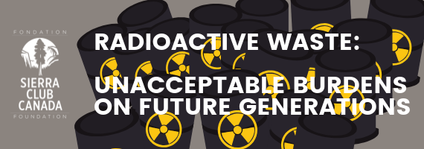
By Dr. Ole Hendrickson
In 2015 the Harper Government gave five corporations based in the U.K., U.S. and Canada a 10-year contract to find fast and cheap ways to dispose of the federal government’s own radioactive waste. The corporations are proposing to build a massive above-ground radioactive waste mound at Chalk River, Ontario; and to convert federal nuclear reactors in Rolphton, Ontario and Pinawa, Manitoba into concrete tombs.
If these projects go ahead, future site managers could keep an eye on things for a time. They could detect leaks from the concrete reactor tombs and take corrective actions, such as intercepting and treating plumes of radioactive water before they contaminated the adjacent Winnipeg and Ottawa Rivers. They could seal cracks in the cover over the giant mound before it leaked its radioactive contents into the Ottawa River.
The corporations propose “institutional control” periods of 300 years for the mound and 100 years for the entombed nuclear reactors.
But sooner or later these radioactive wastes would be abandoned. Facilities would deteriorate. The Winnipeg and Ottawa Rivers would be polluted for hundreds of thousands of years by radioactive substances.
The corporations’ own environment impact statements indicate that people could receive excessive radiation exposures from the contaminated sites.
The mound and reactor tombs would also release radioactive substances during normal operation, failing to meet international standards to isolate wastes from the environment.
Such risks to Canadians exceed the risks that we are willing to accept at present. We do not currently abandon radioactive wastes and allow ordinary citizens to be exposed to them.
Should the corporations that now operate federal nuclear sites be allowed to impose such risks on us and our children? Who should decide?
At present, under the Canadian Environmental Assessment Act, the Canadian Nuclear Safety Commission (CNSC) is the sole decision-making body. Our elected government representatives have no say in this matter.
Under the Nuclear Safety and Control Act, the federal government and CNSC have exclusive jurisdiction over “production, possession and use of nuclear substances.”
But who is responsible for limiting risks to health, safety and the environment once nuclear substances are no longer in use – that is, once they have been abandoned?
Not the nuclear industry, which has already imposed a massive waste burden on society in the form of nuclear reactors for which no decommissioning plans are in place.
Not the CNSC, which has no legally-binding regulations for radioactive waste management.
Not the federal government. Its pathetic 3-bullet Radioactive Waste Policy Framework merely says that waste producers and owners are responsible for facilities required for their wastes.
The federal government owns much of Canada’s radioactive waste. This waste came from federally-funded nuclear research and development activities (e.g., building and operating nuclear reactors) at federally-owned sites scattered across the Canadian landscape. Production of plutonium for the U.S. nuclear weapons program accounted for roughly half the waste at Chalk River.
The federal government estimates the costs of dealing with its radioactive waste liability as being in the range of eight to ten billion dollars.
Are these costs why the federal government seems so unwilling to develop a policy stating clearly that radioactive waste must be kept isolated from the environment, and that future generations must not be exposed to risks that current Canadians would deem unacceptable? Is this why it wants to pass along its toxic legacy to future generations of Canadians?
In the absence of laws, regulations and policies to protect us and our environment, the federal government is giving profit-making multinational corporations over 500 million dollars of your tax dollars every year to implement these unacceptable waste “solutions”. These corporations have opted for abandoning wastes where they will inevitably pollute major water bodies and expose Canadians to unacceptable risks.
Dr. Ole Hendrickson
Concerned Citizens of Renfrew County
and Sierra Club Canada Foundation board member
